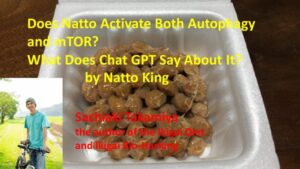AI isn’t as Good at Detecting Information Related to Japan
Get the Japanese Superfood List
This is natto koso genmai fried rice. Another superfood mashup combining the power of natto bacteria and brown rice bacteria.
Now that part 2 has been released; you can listen to the entire interview here.
57 – The Benefits of Ikigai Bio-Hacking with Sachiaki Takamiya – Part 1
58 – The Benefits of Ikigai Bio-Hacking with Sachiaki Takamiya – Part 2
In the previous post, I made the following statement:
Nature teaches you a lot. It gives you wisdom to truly transform your consciousness that I call EI, which I will talk about some other time.
Today, I would like to begin discussing EI. EI isn’t Emotional Intelligence, by the way.
The buzz surrounding AI continues with the introduction of new features in ChatGPT, Bard, and other AI platforms. While many people are incredibly excited about it, do you feel a disparity between their experiences and yours?
Undoubtedly, it is a fabulous tool, and these new features bring forth new possibilities. Nevertheless, there are several limitations to consider.
One major limitation is accuracy. As acknowledged from the beginning, it is not always correct, and I don’t believe it has made significant improvements in recent weeks, as some claim. It is advisable to double-check the answers.
Additionally, as a Japanese speaker, I have noticed that both ChatGPT and Bard are not as proficient in Japanese compared to their abilities in the English language. When I asked them to translate sentences from Japanese to English, they did a decent job. However, when translating from English to Japanese, their performance fell short.
Furthermore, it’s not just about language proficiency. These models also become less effective when searching for information related to Japan. For instance, when I inquired about Atsuhiko Nakata, a well-known YouTuber in Japan, they confused him with Hidetoshi Nakata, a former soccer player. It appears that AI models are still influenced by information that is more prevalent in English.
Another observation relates to creativity. Some people claim that AI can write novels, but as a novelist myself, I don’t share that sentiment. While AI may be able to produce stories with conventional plots, such as a protagonist being a former special forces member facing off against a gang, similar to movies like “Equalizer” and “Transporter,” I still believe they fall short when it comes to original and innovative plots. This is because our experiences, rooted in our five senses and memories, play a significant role.
For example, when I asked them about a cowboy school that was organized by a steakhouse in Tokyo during the 1970s, they were completely off the mark. In fact, I couldn’t find any information on it using Google search engines either; the information was outdated. However, I have personal knowledge of it because I attended the cowboy school as a child, and I have a vivid memory of it.
So, if we were to write a story based on the cowboy school, who do you think would do a better job, me or an AI model?
Certainly, things will improve in the near future, and we will witness a different reality in a few years, I suppose.
However, we must exercise caution as there may be an influx of misinformation generated by individuals who simply copy and paste whatever the AI has said and upload it to various platforms.
It is crucial to take a step back and slow down.
Now, what about EI?
Please be patient. I will address it in due course.

